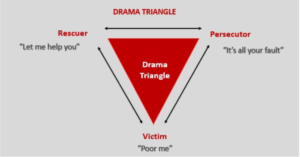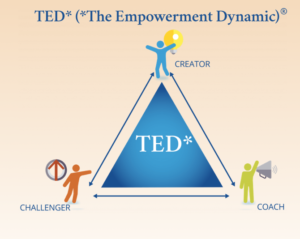Hope in the Manure Pile

“They are stuck in their own manure pile, and they want everyone else to join them. They’re not even trying to get out; they just want to fling their poop around and pull people in!”
I was figuratively talking about people who were playing the victim role (again). This was not the most articulate or professional analogy I could have used. To my credit, I only used it with a few trusted friends (and now you, the reader). During this crappy season, the manure pile analogy became a coping mechanism. It helped to elicit giggles rather than tears and even gave me some compassion for those stuck in figurative poop.
According to Friedman’s A Failure of Nerve,[1] I was experiencing the chaos and dysfunction from “chronic anxiety” in my “family.”[2] Friedman describes five characteristics that emerge in these situations:
- Reactivity— “an intense [response] of each member to events and to one another.”[3]
- The Herd Instinct: where the value of the whole is more important than promoting individualism and separation.[4]
- Blame Displacement: putting the responsibility on someone or something else rather than taking personal responsibility.[5]
- The Quick-Fix Mentality: focusing on removing or relieving the symptom rather than finding and making changes emotionally.[6]
- Poorly Differentiated Leadership: unable to fulfill the vision, controlled by crises, not taking a definitive stance, and limited self-awareness to deal with resistance.[7]
I will respond more to these five characteristics, but first, let’s look at the relationship dynamics that are a part of these “chronic anxiety” situations. One of these dynamics Friedman identifies is “emotional triangles.” This is the idea that relationships come in groups of three and, with it, emotional challenges. For example, a common emotional triangle is the parent-child-parent relationship. Honestly, I struggled to fully grasp the extent of this concept. Overall, it seemed to overlap with Stephen Karpman’s drama triangle.[8]
In the drama triangle, there are three people in a relationship: the victim, who feels sorry for himself; the persecutor (or villain), who blames the victim and rescuer for the problem; and the rescuer (or hero), who comes in to save the day for the victim, enabling the victim and leaving them powerless. People can easily change roles depending on the circumstances.
In the manure pile scenario, I was labeled the villain by the victim (those in the poop) and their heroes (the ones getting pulled into the pile). I, in turn, could have chosen to be a victim, called a hero, and put everyone else in the villain category. However, I had wise counsel directing me to Scripture that encourages us to look beyond our circumstances and focus on the eternal perspective.[9] I chose to step out of the drama triangle and instead enter The Empowerment Dynamic (TED).[10]
TED is the alternative to this victim-villain-hero cycle. It is also a triangle, but it encourages creativity, choice, and change. TED has a creator, a coach, and a challenger. The creator replaces the victim, choosing to look at what they can change rather than the circumstances. The challenger replaces the villain and encourages the creator toward change and growth. The coach replaces the hero, empowering and supporting the creator to learn more about self.[11]
The “challengers” in this situation encouraged me to make a change. My coaches asked me hard questions to process my choices and empowered me to focus on my God-given mission. As the creator, I made the choice to step away from the drama and charter new waters. It was terrifying and liberating at the same time. Through this entire process, I was developing healthy rhythms and habits to counter “chronic anxiety” characteristics. These helped me flip that drama triangle and embrace TED. Here are my top ones:
- Response in due time, instead of reactivity: saying, “I will get back to you about…”
- Carefully articulated personal needs and boundaries countered the Herd Instinct.
- Owning my part, regardless of how big or small it is, replaced blame.
- Intentional time in prayer to determine the next step removed the “quick fix mentality.”
- I owned who God designed me to be rather than be poorly differentiated.
Friedman believed that to change “chronic anxiety,” one must first fix themselves.[12] Scripture also teaches we must examine our own hearts first.[13] Friedman offers a theory; the Bible offers eternal hope. That hope gave me the courage to step away from the manure pile. The situation was not a pleasant one, but it helped me on my journey to becoming a differentiated leader. Most importantly, it strengthened my walk with God.
Now what? I will continue my journey of becoming a differentiated leader, staying far away from other peoples’ manure piles. I live in a multicultural, multiethnic city with people from many different backgrounds and cultures, but “chronic anxiety” crosses cultures because people are the same inside. I cannot change others, but I can continue to grow personally. For those around me, I can be a coach and challenger on their TED discovery. May God use these interactions as a bridge to introduce them to the hope found in Christ.
____________________________________
[1] Edwin H. Friedman, A Failure of Nerve: Leadership in the Age of the Quick Fix, ed. Margaret M. Treadwell and Edward W. Beal, 10th anniversary revised edition (New York: Church Publishing, 2017).
[2] Friedman uses “family” to describe multiple relationships from family to organizational structures.
[3] Friedman, A Failure of Nerve, 99.
[4] Ibid, 105.
[5] Ibid, 117.
[6] Ibid, 126.
[7] Ibid, 133.
[8] Krishna Chodipilli, “The Drama Triangle Explained,” Leadership Tribe US (blog), December 4, 2020, https://leadershiptribe.com/blog/the-drama-triangle-explained.
[9] See James 1:2-4, 1 Peter 1:7, and Philippians 4:11-13.
[10] “Transform Everyday Drama: TED* (*The Empowerment Dynamic),” Center for The Empowerment Dynamic (blog), December 31, 2021, https://theempowermentdynamic.com/about/.
[11] Ibid.
[12] Friedman, A Failure of Nerve, 12.
[13] See Matthew 7:3-5.
12 responses to “Hope in the Manure Pile”
Leave a Reply
You must be logged in to post a comment.


Hi Kari, I enjoyed your post, especially the change from the emotional triangle (or drama triangle) to The Empowerment Dynamic. I have found that it’s difficult to find the root problems in my own self, and therefore easy to slip back into old patterns. In the drama triangle, have you been able to identify any of the root issues that have led you to the triangle?
Hi Christy, I find myself most often being drawn to be the rescuer in the drama triangle. It is a tricky thing because I believe there is an internal desire to truly help people but also that fleshly desire to be the savior. I think a root is pride that thinks that I can be the one to fix the other person.
Back in 2021, three men from Ohio died when entering a manure pit. He is an excerpt from an article written by Rachael Rettner
“People who enter manure pits should take necessary safety precautions. Such precautions include testing gas levels with a meter before entering, or wearing a self-contained breathing apparatus (SCBA) and a safety harness. It’s also important for people who attempt to rescue those trapped in a manure pit to wear protective equipment, according to NASD.
‘Unless the rescuer is wearing SCBA protective equipment … there is a strong likelihood that the rescuer will also succumb to the toxic gases or lack of oxygen. There have been numerous instances where several farmers have been killed while attempting to remove someone from a pit or facility,’ according to the NASD.
‘Always treat a [manure] pit as if it is a death trap,’ the website says.”
So just like in real life, figurative manure piles are dangerous, I agree with you when you suggest that we should not enter them without appropriate assistance making sure we are taking care of ourselves first. Having taken the appropriate precautions, have you identified people that you are actively trying to get out of the manure?
Hi Jeff, Thanks for sharing that article. There are several people in my life that I would love to see come out of their manure piles. I have been investing in their lives, moving forward in encouraging change as I feel led, and also letting go when necessary.
Kari, I learned a lot from reading your post. The “drama triangle” to “The Empowerment Dynamic” was insightful.
The desire to pursue your own inner transformation also demonstrates self-awareness and humility. Thanks for continuing to pursue Jesus as you serve in a very difficult context that could easily sabotage you.
What spiritual disciplines do you find particularly helpful? What disciplines would you like to explore?
Thank you for your encouragement and questions, Graham. I have found listening prayer journal to be particularly helpful on my journey. I love going back through my journals, seeing my prayers, God’s answers in the moment and also his leading in the future. Your question about what discipline do I want to explore more made me grab my book, “An Invitation to Solitude and Silence” by Ruth Haley Barton. During my sabbatical several years ago, I found great healing and renewal in the practice of solitude and silence. Since my sabbatical, I have let that practice slide away. Thanks for the excellent question and the motivation to once again make that an active part of my spiritual life.
Hi Kari,
Great post, thank you for sharing.
How did you feel when you realized you were contributing to the “manure pile,” and what motivated you to break out of that cycle?
Hi Shela, The feelings I was feeling in the pile were definitely of the anxiety and fear orgins. What motivated me to break out of the cycle was a genuine desire for change and a willingness to do whatever it took. I had tried to change others and that wasn’t working, so I knew the next step was to change myself. I realized (too late) that this was the wrong order!
Thank you for this honest post Kari. You write, “Friedman believed that to change “chronic anxiety,” one must first fix themselves.[12] Scripture also teaches we must examine our own heart first.[13] Friedman offers theory, the Bible offers eternal hope. That hope gave me courage to step away from the manure pile. The situation was not a pleasant one, but it helped me on my journey to becoming a differentiated leader. Most importantly, it strengthened my walk with God.”
One of the things I’m researching is self-awareness. What self-awareness have you gained as you’ve dealt with situations like these?
Hi Debbie, I think a powerful self-awareness I had during this process is that I truly desire to see people reach their God-given potential. I also believe God has gifted me in areas to walk along side others and encourage them in their journey. However, this desire can easily shift over into pride, self-reliance, and become an unhealthy output of a savior mentality.
Kari, thank you for starting this read off with a good laugh! The Drama triangle was a real transforming threshold concept for me years ago and I’m happy you brought it in here, along with TED. Towards the end you outlined some healthy practices you’ve put in place to support yourself and you also named that you will be “staying far away from other peoples’ manure piles.” This is not always such an easy task so what are some specific things that help you stay out of others manure piles?
Hi Akwése, you are absolutely right! It is hard to stay away from some manure piles. I’ve learned that when something starts “stinking” it’s a good sign to look around and take precaution! Some of those smelly signs revolve around the drama triangle. When people are playing a direct role in the triangle and show no desire to change, I back away. I have particularly seen this in people who want to stay the victim or those who always need to be the hero/rescuer. Passive and indirect responses are always a big red flag to me (thank you, Friedman for affirming my detest to passivity!). Lastly, secretive, hidden, or deceptive-like behaviors are another no go for me. Whenever I am sensing one of these red flags, I am very intentional to pray about what my response needs to be. God has been very faithful in His response and giving me the courage to say, to do, or to not do something. I also seek out wise counsel who can affirm my initial concerns or perhaps give a different perspective.